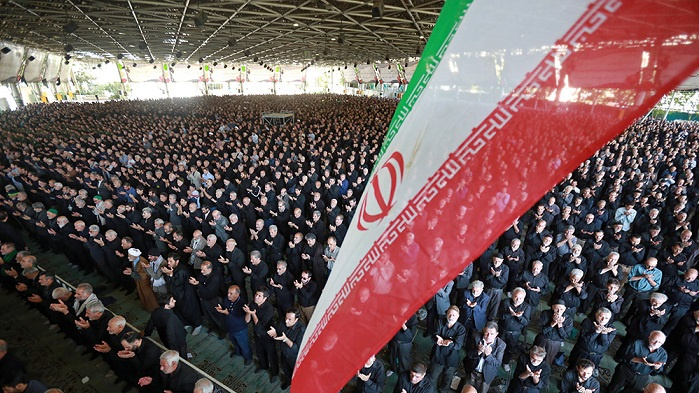Friday Prayers Across Iran: Ashura, funeral bombing in Yemen and cultural concerns

(Clad in black to mark Muharram mourning rituals, Tehran congregation performs Friday prayers. Source: YJC/Soroush Seyed Jamali)
Held two days after Ashura, anniversary of the martyrdom of third Shia imam, Hussein (AS), by the Umayyad caliph Yazid, sermons across the country focused on moral and political lessons from the historical event.
In Tehran, Ahmad Khatami thanked Iranian soccer fans for demonstrating their religious solemnity during Iran national football team’s key football match of Tuesday night against South Korea in World Cup Qualifiers. The timing of the match and its coincidence with one of the ultimate Shia ceremony had raised angst and anger among a number of conservative figures, who had even gone as far as calling for cancellation of the match to preclude excessive jubilance by the football fans in Muharram. Khatami praised the spectators for observing Tasu’a rituals inside the Azadi stadium.
In Shiraz, Friday prayers’ leader of the city Ayatollah Imani addressed JASTA, Justice Against Sponsors of Terrorism Act passed by the US Congress which paves the way for American citizens to file suit against the Saudi government regarding the 9/11 attacks. Imani recounted three reasons for United States’ ratification of the act: relieving global pressures by distancing itself from Saudi Arabia, forging a new excuse to sponge more money from Riyadh, and stripping Saudi Arabia’s off its petrodollars. Nonetheless, he reminded the congregation that the seventy-year bond between United States and Saudi Arabia will not come to an end over night.
Tehran’s Friday prayers’ leader Ahmad Khatami slammed Saudi Arabia for its latest war crime in Yemen, the bombing of a funeral in the Houthi-controlled city of Sana’a which killed more than 150 Yemenis, with hundreds injured. “If there existed international justice and a fair international tribunal, your government should be designated as war criminal” he addressed the Saudis. Khatami also called Britain and United States accomplices in the catastrophe.
In Mashhad, Ahmad Alamolhoda continued with his criticism of cultural officials for their “indifference towards the soft power” of the West aimed to undermine the Islamic Republic through moral “promiscuity”. Similar concerns were expressed by Mohsen Mojtahed Shabestari, Friday prayers’ leader of Tabriz in northwest of Iran, who warned about the ‘enemies’ efforts to promote cultural degradation among Iranian youth in order to reestablish its domination over Iran affairs. Shabestari also lamented ignorance towards cultural issues among officials.
IRD/66

